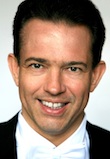
Christoph Campestrini, conductor
..
.
 |
|
Christoph Campestrini, conductor |
|
b i o g r a p h y...........back to roster....up July 2012 Recognized widely as a young conductor of enormous musical talent and deep introspection, Austrian native Christoph Campestrini has been lauded by critics for his "youthful energy and nice sense of phrasing" (The New York Times) and "vibrant eloquence" (Le Soleil). Appraising his interpretation of Schubert’s Ninth Symphony, the Denver Post observed that "he brought a sense of immediacy and drama to this music, conveying the architectural scope of the massive piece while highlighting its inner dialogues and dynamic contrasts." Such accolades have given rise to a career that brought him together with over ninety orchestras on five continents, among them the London Symphony Orchestra, Philadelphia Orchestra, Houston Symphony, Detroit Symphony, Vancouver Symphony, Milwaukee Symphony, Florida Orchestra, Deutsche Sinfonieorchester Berlin, Frankfurt Radio Symphony, Stuttgart Philharmonic, Moscow Radio Symphony, Prague Philharmonia, Vienna Radio Symphony, Mozarteum Orchestra Salzburg, Orchestre National du Capitole de Toulouse, Queensland Philharmonic, Israel Sinfonietta and many others. He has also nurtured close collaborations with such soloists as Gidon Kremer, Julian Rachlin, Rudolf Buchbinder, Sharon Kam, Julia Fischer and Emmanuel Pahud. A graduate of Juilliard and Columbia University, Campestrini got his initial break when he was chosen as the only European artist to the founding class of the Yale University Affiliate Artists Conducting Program, at the time the preeminent program of its kind. While at Yale, he received important artistic impulses by the likes of Lorin Maazel, Wolfgang Sawallisch and Kurt Sanderling. Although at home in a wide range of repertoire and championing the music of contemporary composers, he feels a particular affinity with the music of his compatriots Schubert, Bruckner and Mahler. Campestrini is equally in demand as an accomplished opera conductor. He has served as principal conductor of the Essen Aalto Musiktheater and the Essen Philharmonic Orchestra, where he conducted more than 15 different operas in over 100 performances. Other opera credits over time have included the Deutsche Oper am Rhein in Düsseldorf (Die Zauberflöte), Opera Lyra Ottawa (Le nozze di Figaro), Austin Lyric Opera (Don Giovanni), Cremona Opera, and Zagreb National Opera. Next season brings his debut at the Edmonton Opera with Offenbach’s Les contes d’Hoffmann before returning to the Quebec Symphony and conducting the Fort Wayne Philharmonic for the first time. Highlights overseas include his China debut with the Xiamen Philharmonic and re-engagements with the Real Orquesta Sinfonica de Sevilla, Orquesta Filharmonica de Gran Canaria and the Liège Royal Philharmonic. In addition, he tours Austria with both the Chamber Orchestra of the Vienna Symphony and the Polish National Radio Symphony Katowice. Noteworthy orchestral dates during 2011/12 comprised a Beethoven Gala with the Indianapolis Symphony and Lang Lang as soloist, his debut with the Rochester Philharmonic, and concerts with the Württembergische Philharmonie in Germany and the Real Orquesta Sinfonica de Sevilla. He also led a production of Massenet’s Werther in the pit of the Minnesota Opera. Among the previous season’s North American highlights figured engagements with the Vancouver Symphony, Toledo Symphony, Grand Rapids Symphony and Quebec Symphony, in addition to an appearance at the Round Top Festival. Furthermore he appeared for a New Year’s concert at the Teatro Regio in Torino, and led the Sinfonieorchester Wuppertal, the Nürnberg Symphony and Liège Royal Philharmonic, the latter at the Musikverein. His opening concert of the Carinthian Summer Festival rounded out the calendar. In Europe, he maintains a permanent relationship with the Czech State Philharmonic Brno, which he conducts in several programs each season as well as on tour. He also regularly works with the Camerata Salzburg, Bruckner Orchestra Linz and the Slovak Philharmonic. Christoph Campestrini was born in Linz, Austria, and received his musical education at the Juilliard School while simultaneously majoring in philosophy and languages at Columbia University. In addition to German and English, he speaks Italian, French, Russian and Spanish.
|
. r e v i e w s...........back to roster....up INDIANAPOLIS SYMPHONY QUEBEC SYMPHONY GREEN BAY SYMPHONY TOLEDO SYMPHONY HOUSTON SYMPHONY MILWAUKEE SYMPHONY COLORADO SYMPHONY HOUSTON CHRONICLE CZECH STATE PHILHARMONIC OF BRNO – Bruckner,
Te Deum JOHANN STRAUSS ENSEMBLE – Brucknerhaus (Linz) MOZARTEUM ORCHESTRA (Salzburg) FRANZ SCHUBERT ORCHESTRA NEW YORK – Salieri, D-Major Mass |
| N E W S |